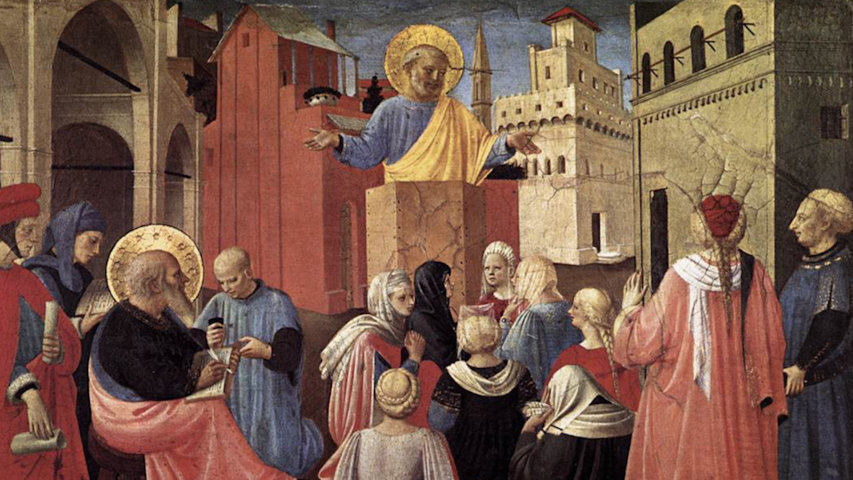It was a delight to preach and preside at the Eucharist at Holy Trinity, Guildford yesterday. The texts were: Genesis 2:4b-9, 15-25, Revelation 4, Luke 8:22-25
Given the choice, where would you prefer to spend a day:
- in a garden, your own or Wisely perhaps or;
- by the sea, sitting in a deckchair or;
- at the heart of the city?
As a rural lass, with an urban heart and a sister who loves the sea, like many of us I end up inhabiting all three.
But lacking the green fingers of my parents, and the proximity to the coast, the buzz of the city draws me moth like to it’s light.
Gardens: places of tranquility and seasonal beauty; a haven of privacy and place for conviviality; a glimpse of paradise and a place of labour.
The sea: the expanse of sand or shingle ridges and the hypnotic roar of waves; a place of ice-cream and fish and chips; a haven of peace, subject to nature’s unpredictable force.
City: the energy of people filling streets and theatres, platforms, hostels and galleries; the vendors, commuters, performers and consumers; a sleepless place of restless inequality.
Today’s readings straddle all this: a garden blessed and tended; a sea raging that is calmed; a city dazzling consumed by praise.
In the garden, by the sea and amidst the city, we are caught up in the story of God’s ways with the world and the destiny of humanity.
In Genesis we see a world which is teaming with life in all its diversity: it is good and pleasing, generative and sustainable.
We are earth creatures, formed of clay; we are God’s creatures, breathed into life.
We are placed in a world of mutual interdependence. We are in a profound way bound together with the glorious goodness of the created order. It is not a world of our own making. God’s gift is one of interdependence. We are blessed by delight and entrusted with responsibility.
In this delicate eco-system, we are confronted with the reality that it is not good for this human to be alone.
A fresh creative act of God brings forth a helpmate.
It is not good or right for this man, this one formed of earth, this adam, to be alone.
Like each one of us, this solitary human needs a helpmate.
We need companionship. The wellbeing of one is not fulfilled by dependence on God or creation alone.
Out of our creaturely flesh our most intimate other is formed: one who opens up what it is to be human - in relation to God and the world.
In the first instance this is not about hierarchy, complementarity or marriage. Rather it points to a fundamental goodness in being together. There is the possibility of work and creativity as custodians of the earth. As we face one another, we learn compassion, generosity and joy.
As Walter Brueggemann puts it: ‘The place of the garden is for this covenanted human community of solidarity, trust and well being. They are one! That is, in covenant. The garden exists as a context for the human community.’
This vision of generative human companionship and shared endeavour, is gifted to us freely. God’s loving purpose for us is based in freedom, not coercion. But such freedom is fraught with risk.
Goodness is disrupted. Faithful obedience becomes an assertion of self-will. Life and knowledge are within our grasp. The prohibition will be scrutinised and misquoted and we seize the fruit of that tree for ourselves.
And, as Genesis will tell it in the following scene, freedom, trust and calling are exchanged for autonomy, oppression and fragmentation
We know all too well the pain of what happens when we selfishly take the mysteries of life and knowledge into our own hands apart from God: freedom to act becomes the capacity to control.
We become fearful and mistrusting; our hearts turn inwards, away from the other; we are ashamed of our naked vulnerability and dependence.
The tranquility of the garden paradise breaks; we find ourselves on stormy seas.
Our struggle to know how to live well with one another is met by the commandments to love God and neighbour as ourself.
Our struggle with how to live wisely in the world is bet by the prophets cry for justice and mercy.
Our struggle to know how to live is ultimately met with a new act of solidarity. By God refusing to refuse love; by God dwelling with us in Christ Jesus.
Jesus understands our anxieties and fears; he knows our tendency to selfishness and self-protection; he knows our capacity to wound and be wounded; and also knows our desire to heal and be healed.
Jesus stepped into the boat: and he slept. As flesh of our flesh, he gives into his physical need for rest; as Word made flesh, he abides in trusting rest with God.
The storm arises: disruptive and ferocious. It stirs the chaos from the deep. It surges and threatens to overwhelm. It has mastery over the boat and over seasoned sailors.
And amidst the terror and looming disaster, Jesus sleeps.
The storm does not disturb him; but wakes to our cries.
And with a word of rebuke the Word brings calm: wind and waves are subdued. This sign of mastery over creation and is also a renewed breathing into us of God’s life.
Who then is this?
Here is perfect love casting out fear.
Here God’s Word addresses us in the midst of the storm.
In the midst of those things which fill us with dread, heartache and trembling... God is.
God is with us in the betrayals and losses; the anxiety and grief; in the things which break us down and when faith wavers.
God. is. with. us.
Loving us.
The God who created us that we might be one, comes to us in flesh and blood. His body heals and teaches; is touched and anointed; is spat at and wept over; breaks bread and is broken for us.
And we God’s creatures are made one as we share in fragments of bread. Here we are moved beyond the ties of biological kinship and commitment of flesh and blood. Genesis speaks of being one and here, though we are many we are one body.
Here we are called by name and nourished with the bread of heaven: the covenant of love is renewed.
Here we at this Eucharist we are led through stormy seas from creation to new creation. From the beauty and labour of our earthly garden, we are given a glimpse of a heavenly city.
A city where, in the words of John Donne, there is no darkness nor dazzling but one equal light; no noise nor silence, but one equal music; no fears nor hopes, but one equal possession; no ends nor beginnings, but one equal eternity.
Here and now we unite our voices with the saints and angels singing ‘holy, holy, holy; Lord God almighty; who was and is and is to come.
As we praise our creator God, we are united with Christ in one body. But what we say and sing with our lips we are to live out in our lives: in the urban heart of Guildford and in our gardens; amidst personal storms and at work or school.
In a world of chaos, pain and noise, in the power of the Spirit, may we be one as a people whose hearts are turned outwards to the other.
Breath by breath may we be compassionate, generous and peaceable companions on stormy seas.
Gesture by gesture, may we be creative and just in our commitment to the earth’s sustainability.
Word by word, may we walk in the light of Christ, seeking the equity and fearlessness of a heavenly city.
© Julie Gittoes 2019













